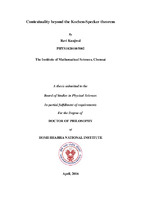- DSpace Home
- →
- IMSc Theses/ Dissertations
- →
- IMSc Theses/ Dissertations
- →
- View Item
JavaScript is disabled for your browser. Some features of this site may not work without it.
| dc.contributor.author | Ravi Kunjwal | |
| dc.date.accessioned | 2016-08-19T05:21:50Z | |
| dc.date.available | 2016-08-19T05:21:50Z | |
| dc.date.issued | 2016 | |
| dc.date.submitted | 2016 | |
| dc.identifier.uri | https://dspace.imsc.res.in/xmlui/handle/123456789/381 | |
| dc.description.abstract | The Kochen-Specker (KS) theorem is a fundamental result in the foundations of quantum theory showing that it is impossible to accommodate the predictions of quantum theory within a framework in which outcomes of measurements are pre-determined in a noncontextual manner. Failure of such a noncontextual model in accommodating quantum theory is often called contextuality in quantum information and quantum foundations. Along with Bell’s theorem, the Kochen-Specker theorem is one of the two major no-go theorems in quantum foundations. While Bell’s theorem has proven to have wide-ranging implications for quantum information, the KS theorem has remained largely of foundational interest owing to implicit idealizations that make its experimental testability a matter of controversy. This thesis considers contextuality beyond the Kochen-Specker theorem in two ways: 1. The Kochen-Specker framework is applicable only to sharp (or projective) measurements in quantum theory. We consider questions of contextuality for unsharp (or nonprojective) measurements in quantum theory, as these are the ones that are typically implemented in practice in any experiment because of inevitable noise in the implementation. This goes beyond the Kochen-Specker theorem in the sense of allowing nonprojective measurements, albeit still assuming that the operational theory of interest is quantum theory. As we show, these nonprojective (unsharp) measurements in quantum theory exhibit (in)compatibility relations that are impossible for projective measurements, allowing for considerations of contextuality in scenarios not envisaged by the KS theorem. 2. We then show how to extend the applicability of contextuality from quantum theory (for which Kochen-Specker theorem holds) to more general operational theories called generalized probabilistic theories (GPTs). This allows a treatment of contextuality that does not presume a quantum model of the experiment and lays the groundwork necessary for applications of contextuality to device-independent quantum information processing. From a foundational viewpoint, this strengthens the Kochen-Specker theorem by turning it into experimentally robust incarnations. This also allows tests of contextuality outside the ambit of the experimental scenarios envisaged by the KS theorem. The following conclusions can be made on the basis of work presented in this thesis: 1. Specker’s scenario - the simplest one capable of admitting contextuality with respect to joint measurement contexts - allows a proof of contextuality à la Spekkens on a qubit with nonprojective measurements. 2. Quantum theory allows arbitrary joint measurability structures when considering the most general quantum measurements, as opposed to the restricted possibilities offered by projective measurements. 3. Fine’s theorem does not absolve one of the need to justify outcome determinism in noncontextual ontological models of quantum theory. 4. It is possible to rule out noncontextuality for arbitrary operational theories rather than quantum theory alone, following our operationalization of the KS theorem. We provide criteria for the same. 5. Specker’s scenario also admits theory-independent criteria for deciding contextuality and leads to a generalization of such criteria to all n-cycle scenarios. | en_US |
| dc.publisher.publisher | The Institute of Mathematical Sciences | |
| dc.subject | Kochen-Specker Theorem | en_US |
| dc.subject | Quantum Foundations | en_US |
| dc.subject | HBNI Th94 | en_US |
| dc.title | Contextuality beyond the Kochen-Specker theorem[HBNI Th94] | en_US |
| dc.type.degree | Ph.D | en_US |
| dc.type.institution | HBNI | en_US |
| dc.description.advisor | Sibasish Ghosh | |
| dc.description.pages | 268p. | en_US |
| dc.type.mainsub | Physics | en_US |
| dc.type.hbnibos | Physical Sciences |
Files in this item
This item appears in the following Collection(s)
-
IMSc Theses/ Dissertations
IMSc Theses/ Dissertations
